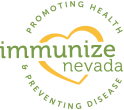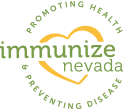FAQs
GENERAL:
- What are vaccinations?
- What diseases do vaccines protect against?
- Why is vaccinating so important?
- How do vaccines prevent disease?
- What would happen if we stopped immunizations?
- What are some of the common misconceptions about vaccinating?
- How many times do I need to bring my child in for vaccinations?
- Isn't there some way besides vaccination to protect children against these diseases?
- What if my child isn't a baby anymore? Is it too late to get him or her vaccinated?
- What vaccines do adults need?
- How do I comfort my baby after his/her shots?
SAFETY:
- Are there any vaccine side effects?
- What if my child has a cold or fever, or is taking antibiotics? Can he/she still get vaccinated?
- I heard that some vaccines can cause autism. Is this true?
- Are vaccinations safe?
COST:
- What effect does the Affordable Care Act (aka Obamacare) have on immunizations?
- My children are covered by Nevada Check-Up does that mean I will be billed for vaccines?
- Will I be billed for the administration of a vaccine?
- How will I know if vaccines are covered under my health plan?
- I have health insurance but they do not cover vaccines, what options do I have?
- I just took my children to their physician for vaccines; what will I see on my bill?
- Which children are eligible for VFC program?
- How do I find a VFC provider?
GENERAL:
Vaccinations (vaccines) protect your child against serious diseases by stimulating the immune system to create antibodies against certain bacteria or viruses. Most vaccinations are given as injections.
What diseases do vaccines protect against?
Vaccines protect against diseases like measles, mumps, rubella, influenza, hepatitis B, hepatitis A, polio, tetanus, whooping cough, chickenpox, rotavirus, and more. Vaccines can't protect children from minor illnesses like colds, but they can keep children safe from many serious diseases.
Why is vaccinating so important?
Disease prevention is key to public health. It is always better to prevent a disease than to treat it. Vaccines can protect both the people who receive them and those with whom they come in contact. Vaccines are responsible for the control of many infectious diseases that were once common in this country and around the world, including polio, measles, diphtheria, pertussis (whooping cough), rubella (German measles), mumps, tetanus, and Haemophilus influenzae type b (Hib). Vaccine eradicated smallpox, one of the most devastating diseases in history. Over the years vaccines have prevented countless cases of infectious diseases and saved literally millions of lives. Vaccine-preventable diseases have a costly impact, resulting in doctor's visits, hospitalizations, and premature deaths
How do vaccines prevent disease?
This is one of the most common concerns about vaccines. However, it's impossible to get the disease from any vaccine made with dead (killed) bacteria or viruses or just part of the bacteria or virus.Only those immunizations made from weakened (also called attenuated) live viruses — like the chickenpox (varicella) or measles-mumps-rubella (MMR) vaccine — could possibly make a person develop a mild form of the disease, but it's almost always much less severe than the illness that occurs when someone is infected with the disease-causing virus itself.
What would happen if we stopped immunizations?
In the U.S., vaccination programs have eliminated or significantly reduced many vaccine-preventable diseases. However, these diseases still exist and can once again become common—and deadly—if vaccination coverage does not continue at high levels.
What are some of the common misconceptions about vaccinating?
The following are six common misconceptions that appear in literature about vaccination:
- Diseases had already begun to disappear before vaccines were introduced, because of better hygiene and sanitation.
- The majority of people who get a disease have been vaccinated.
- There are "hot lots" of vaccine that have been associated with more adverse events and deaths than others.
- Vaccines cause many harmful side effects, illnesses, and even death.
- Vaccine-preventable diseases have been virtually eliminated from the United States.
- Giving a child multiple vaccinations for different diseases at the same time increases the risk of harmful side effects and can overload the immune system.
How do I know when to take my child in for shots?
Your healthcare provider should give you a reminder when the next doses are due. If you are not sure, you can do one of two things:
- Access online immunization records through Nevada WebIZ.
- Call your clinic or healthcare provider's office to find out when you should bring your child back. Doses cannot be given too close together or immunity doesn't have time to build up. On the other hand, you don't want to delay your child's shots and because during this time, your child remains unprotected against these diseases.
How many times do I need to bring my child in for vaccinations?
At least five visits are needed before age two, but the visits can be timed to coincide with well-child check-ups. Your baby should get the first vaccine (hepatitis B) shortly after birth, while still in the hospital. Multiple visits during the first two years are necessary because there are 14 diseases your baby can be protected against, and most require several doses of vaccine for the best protection. If you access your child's immunization record through Nevada WebIZ, their shot record will have a personalized list of immunizations for which they are due.
I don't know anybody who has had measles or rubella. Why does my child need these shots?
You might not think that measles and rubella are a threat today because you don't see or hear much about them, but they are still around. These diseases are common in other parts of the world and are just a plane ride away. If we stop vaccinating against these diseases, many more people will become infected. Vaccinating your child will keep him or her safe.
Isn't there some way besides vaccination to protect children against these diseases?
No. Breastfeeding offers temporary immunity against some minor infections like colds, but it is not an effective means of protecting a child from the specific diseases preventable by vaccines. Likewise, vitamins don't protect against the specific bacteria and viruses that cause these serious diseases. Of course, infection usually results in immunity, and some parents think that getting the "natural" disease is preferable to "artificial" vaccination. Some even arrange chickenpox "parties" to ensure their child is infected. However, the price paid for natural disease can include paralysis, retardation, liver cancer, deafness, blindness, or even death. Vaccination is definitely a better choice!
What if my child isn't a baby anymore? Is it too late to get him or her vaccinated?
No. Although it's best to have your child begin vaccinations as a newborn, it's never too late to start. If your child has not received any, or all, of his or her vaccinations, now is the best time to start.
Adults need vaccines for all of the vaccine-preventable childhood diseases. For a list of these, visit the CDC website. Also, diseases that are especially serious for adults age 65 and older are as follows: diphtheria, herpes zoster (shingles), influenza (flu), and pneumococcal tetanus (lockjaw). More information on these diseases is also located on the CDC website.
How do I comfort my baby after his/her shots?
Some vaccines that protect children from serious diseases can also cause discomfort for a while. A mild fever and soreness are very common, and can be easily resolved with a medicine such as acetaminophen or ibuprofin (follow the package directions for dosages). Ice packs or cool, wet washcloths can also offer relief from soreness and swelling. Click here for more questions and answers regarding vaccine reactions.
SAFETY:
Are there any vaccine side effects?
Any vaccine can cause side effects. For the most part these are minor (for example, a sore arm or low-grade fever) and go away within a few days. Listed on the CDC website (http://www.cdc.gov/vaccines/vac-gen/side-effects.htm) are vaccines licensed in the United States and side effects that have been associated with each of them. This information is copied directly from CDC's Vaccine Information Statements, which in turn are derived from the Advisory Committee on Immunization Practices (ACIP) recommendations for each vaccine. Remember, vaccines are continually monitored for safety, and like any medication, vaccines can cause side effects.
What if my child has a cold or fever, or is taking antibiotics? Can he/she still get vaccinated?
Yes. Your child can still be vaccinated if he or she has a mild illness, a low-grade fever, or is taking antibiotics. Ask your child's healthcare provider if you have questions.
I heard that some vaccines can cause autism. Is this true?
No. Scientific studies and reviews have found no relationship between vaccines and autism. Groups of experts, including the American Academy of Pediatrics and the Institute of Medicine (IOM), also agree that vaccines are not responsible for the number of children now recognized to have autism.
Is it okay for my baby to have so many shots at once?
Yes. Studies show that kid's bodies-even infants-can handle many shots at once. Having several vaccines at once is safe, even for a newborn. Combination vaccines protect your child against more than one disease with a single shot. This reduces the number of shots and office visits your child would need. It's not your imagination; there are a greater number of shots now than even a few years ago. That's because as science advances, we are able to protect your child against more diseases than ever before.
Vaccines are safe, and scientists continually work to make sure they become even safer. Every vaccine undergoes many tests before being licensed, and its safety continues to be monitored as long as the vaccine is in use. Most side effects from vaccination are minor, short-lived, and treatable, such as soreness at the site of injection or a low-grade fever. Serious reactions are very rare, and have to be weighed against the very real risk of getting a dangerous vaccine-preventable disease. If you have concerns or questions, talk to your child's healthcare provider. You can get information on Vaccine Ingredients here and here.
COST:
What effect does the Affordable Care Act (aka Obamacare) have on immunizations?
All children and adults enrolled in new group or individual private health plans will be eligible to receive vaccines recommended by the ACIP without any cost-sharing requirements when provided by an in-network provider as of September 23, 2010. Vaccines are considered an essential health benefit.
- Hepatitis A
- Hepatitis B
- Shingles
- Human Papillomavirus
- Influenza
- Measles, Mumps, Rubella
- Meningococcal
- Pneumococcal
- Tetanus, Diphtheria, Pertussis
- Varicella
- Rotavirus
- Polio
My children are covered by Nevada Check-Up does that mean I will be billed for vaccines?
Children covered under the State Child Health Insurance Program or Nevada Check-Up receives state funded vaccines and therefore parents will not be billed for the vaccines.
Will I be billed for the administration of a vaccine?
Providers may charge you for an administration fee, however, Vaccine for Children (VFC) providers enrolled with Nevada Immunization program may not refuse to administer vaccines due to inability for parents to pay for administration fee.
How will I know if vaccines are covered under my health plan?
The Nevada State Health Division urges parents to check their insurance policies to see which vaccines are covered by their plans.
I have health insurance but they do not cover vaccines, what options do I have?
There are a few options you can take. First call you health plans and discuss your questions. Second many employers' health plans offer Flex Plan benefits. This option can offset the expense of out-of-pocket vaccination expenses which are not covered by insurance. In Nevada, this is considered "underinsured" and you can be vaccinated at a Federally Qualified Health Center.
I just took my children to their physician for vaccines; what will I see on my bill?
The billing you receive, also called the explanation of benefits report, may include deductibles, administration fees, coinsurance and or co-payments for vaccinations; and any associated office visit charges.
Which children are eligible for Vaccines For Children (VFC) program?
Children through 18 years of age who meet at least one of the following criteria are eligible to receive VFC vaccine:
Medicaid eligible: A child who is eligible for the Medicaid program. (For the purposes of the VFC program, the terms "Medicaid-eligible" and "Medicaid-enrolled" are equivalent and refer to children who have health insurance covered by a state Medicaid program.)
Uninsured: A child who has no health insurance coverage.
American Indian or Alaska Native: As defined by the Indian Health Care Improvement Act (25 U.S.C. 1603)
Underinsured: A child who has commercial (private) health insurance but the coverage does not include vaccines, a child whose insurance covers only selected vaccines (VFC-eligible for non-covered vaccines only), or a child whose insurance caps vaccine coverage at a certain amount. Once that coverage amount is reached, the child is categorized as underinsured. Underinsured children are eligible to receive VFC vaccine only through a Federally Qualified Health Center (FQHC) or Rural Health Clinic (RHC). Children whose health insurance covers the cost of vaccinations are not eligible for VFC vaccines, even when a claim for the cost of the vaccine and its administration would be denied for payment by the insurance carrier because the plan's deductible had not been met. Get more information on the VFC Program here.
You can search for a provider by zip code here. More information is also available at the Nevada Division of Public and Behavioral Health website.




